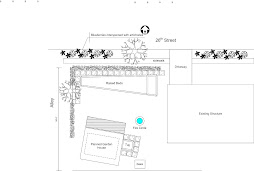I have no love for these particular trees. European White Poplars (Populus Alba) propagate roots aggressively and have invaded nearly every garden bed I've tried to create, in some cases so badly that beds had to be abandoned or completely dug out. Each spring they also spend about three weeks dropping copious amounts of white, fluffy seed everywhere.
On the plus side, they are trees. That's a basic bonus in my book. They also have a nice sound to them in the wind, as many cottonwoods and poplars do. In summer time the breeze rattles the leaves nicely and if I can forget about their encroachment on my gardens for a moment, it's lovely to hear them. The trees also provide good shade for my house and now after considerable pruning on one of them even look pretty good.
I'm at a crossroads with the smaller of the two remaining trees, however, which is planted in the narrow strip between sidewalk and street on the north side of my garden. It's sending shoots again, seemingly everywhere and nearly wiped out a bed of raspberries last year. It's also buckling the sidewalk, which doesn't irk me so much but will at some point attract the attention of the City maintenance folks who will require the tree to be removed.
Truth be told, the real driver for my discontent for this particular tree is that I'd very much like to put a couple of plum trees in that spot to broaden the variety of fruit the lot produces.
So, my quandry involves the decision to replace one tree with another. It's a weighty choice in my book and I've considered this situation now for more than a year. I remember once taking out a neglected and fairly unattractive laurel hedge, not thinking much about it, only a few days later finding myself in a cafe looking at a lovely set of venerable laurel shrubs that had been carefully and artfully shaped into small trees. I was immediately struck by the contrast between how long it took the laurels to grow and how quickly I had been able to remove them. My own lack of vision and creativity also confronted me inescapably in that encounter.
I don't think my poplar has anything like the aesthetic potential the laurel hedge might have. It's a badly shaped tree despite the fact that I've already done all that I can to improve its shape. Nonetheless, this poplar does have standing. It's probably almost as old as I am. The burden of proof seems to me to be mine.
Rationally, gardeners like me replace one species with another all the time. We make choices based on productivity, taste, aesthetics, etc. on a regular basis...acting as judge, jury, executioner, and midwife simultaneously. But, the price of that arrogance is easily seen all around us in our depleted soils, wasted streams, and ravaged forests. Deciding quickly and only in consideration of utility predictably yields short term results and weakens the bigger communities which both consist of and support the things we decide are useful.
Trees may or may not make choices in the way we understand choice, but they do behave in varying ways and, as is the case of my poplar (an introduced species), often interact aggressively with their surroundings (the other introduced species of my garden).
This story's clearly not over, but I'm out of time for now.
